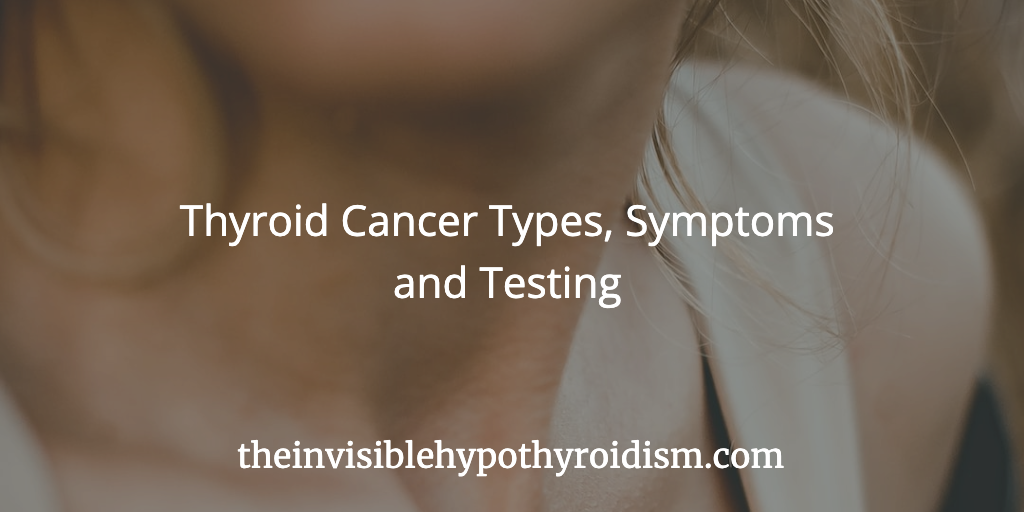Originally published on 12th May 2016 Last updated on 19th January 2024
While many people survive thyroid cancer, it can be a complicated cancer to diagnose and treat, so it’s important we’re aware of the signs and symptoms.
I’ve covered some information on thyroid cancer symptoms, testing and types, below.
What Are Thyroid Cancer Survival Rates?
Just like having hypothyroidism, thyroid cancer requires lifelong monitoring, but has a high survival rate.
After treatment for thyroid cancer, which often results in hypothyroidism, a doctor will closely monitor for signs of cancer recurrence as well as aim to optimise thyroid hormone levels.
By regularly monitoring, it helps the patient and their doctor to keep on top of any possible recurrence of cancer.
Thyroid cancer is two to three times more common in women, although the causes for thyroid cancer are quite unknown.
What Are The Signs and Symptoms of Thyroid Cancer?
Some patients with thyroid cancer do not develop any symptoms, whereas others may notice they have a lump or enlarged thyroid gland.
Physical Symptoms Can Include:
- Pain in the neck
- A hoarse voice
- Enlarged lymph nodes, neck or thyroid
- Thyroid nodule or lumps
If you notice any of these symptoms or follow this information on how to check your neck for any abnormalities and find something you’re concerned about, you must see a doctor as soon as possible.
The above symptoms can be concerning, since quite a big chunk of people with hypothyroidism will experience some of them without having cancer, but it’s better to be safe than sorry.
The Four Types of Thyroid Cancer
There isn’t one type of thyroid cancer, but actually four different types.
Papillary cancer
This is the most common type of thyroid cancer. It tends to involve one side of the thyroid gland, although it sometimes spreads into the lymph nodes too. The survival rate is very high.
Follicular cancer
This is the second most common type of thyroid cancer. With this type, the cancer doesn’t usually spread to the lymph nodes, but instead can spread to arteries and veins of the thyroid. It could possibly spread to the lungs, bone, skin etc. Follicular cancer is more common in older people. The survival rate is very high.
Medullary cancer
This is the third most common type of thyroid cancer. It arises from C cells, which make the hormone calcitonin. This type of thyroid cancer originates in the upper central lobe of the thyroid and it spreads to the lymph nodes much earlier than the two cancers above. The survival rate is very high.
Anaplastic
Anaplastic is the most rare but most serious type of thyroid cancer. It can spread early on to lymph nodes and it is most likely to spread to other organs, too. It is more common in those over 65 and in men. Survival rates are quite a bit less than for the other three types of cancer above.
What is The Treatment For Thyroid Cancer?
Treatment for thyroid cancer depends on the type of cancer, as well its size and the stage it is at.
We’re all individual, after all and so are cases of cancer.
- In most cases of thyroid cancer, the thyroid gland is surgically removed. This is known as a thyroidectomy. After a thyroidectomy, patients require lifelong thyroid medication, to replace what their non-existent thyroid is no longer producing for them.
- Some patients are given radioactive iodine treatment, also known as remnant ablation. This is often given to kill off any thyroid tissue remaining after the thyroid surgery.
- Some experts recommend that following treatment, TSH levels should be kept low or undetectable, to help prevent a recurrence of the cancer.
Diagnosis and Detection of Thyroid Cancer May Involve:
- A thorough physical exam, where a doctor will check for any abnormalities.
- A fine needle aspiration biopsy (FNA) on nodules or lumps.
- A nuclear scan, also known as radioactive iodine uptake (RAI-U) scan.
- A CT scan, known as computed tomography or a cat scan.
- Magnetic resonance imaging (MRI) scan.
- A thyroid ultrasound.
- When medullary thyroid cancer is suspected, doctors tend to check for high levels of calcium.
Remember, if you suspect anything suspicious or indicative of thyroid cancer or any complications of your health, always get to a doctor as soon as possible for examination. Early detection is key.
Related Post: Resources for Those with Experience of Thyroid Cancer
Do you have experience with thyroid cancer? Share your experience below in the comments.
You can click on the hyperlinks in the above post to learn more and see references to information given.






